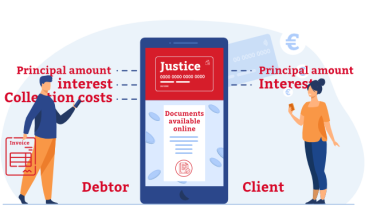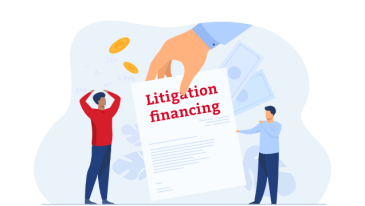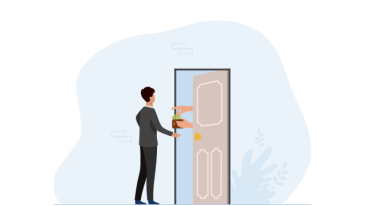6 Steps to payment

Step 1: Send a payment reminder
Your customer does not pay? Set up a friendly payment reminder! If this does not lead to payment, you can proceed to the next step.
Personal contact with your customer
We advise you to personally approach your customer about an outstanding claim. Sending a reminder immediately threatening recovery measures is usually not an appropriate response. A reminder letter with the request to pay an outstanding bill or a telephone call is an appropriate action. This demonstrates a strict and professional debtor policy. Often your customers also have problems with defaulters. Consult with your customer and look for the cause of a non-payment to solve it together.
Notice of default for a B2B claim or a WIK letter from a consumer
If your customer has not yet responded to a payment reminder or if agreements have not been met, it is important not to lose time. Send a notice of default if it is a business customer. Send a so-called WIK letter if your customer is a consumer. The letter that complies with all legal requirements and has been tested in legal practice can be requested free of charge. You will receive this sample letter by email. All you have to do is fill in your own details.
Guidelines
It is important that the WIK letter complies with the new guidelines for reminders:
- After receiving the letter, give the customer 14 days to pay free of charge.
- Indicates the amount of collection costs that will be charged if payment is not made.
- If you request this letter via our website, you will receive a calculation module by e-mail. The collection costs are automatically calculated in accordance with the Collection Costs Act (WIK).
- If you want to engage Justice as a third party after the term has expired, state this in the letter. This is often enough for your debtor to pay.

Step 2: Submit your outstanding invoice/claim
Do you want to outsource a case right away? After receiving the documents, we get to work quickly and decisively, with respect for your customer.
What do we need to start a collection procedure?
- if you have this, your delivery terms and conditions (if you are a private client, this is not an issue).
- a copy of the agreement.
- if there is no signed agreement, please provide as much information as possible so that we can determine how the claim came about.
- invoice(s), acknowledgment of debt or other documents evidencing the claim.
- e-mail(s) and any correspondence.
- telefoon- en/of GSM nummer(s), e-mailadres van een debiteur.
- a copy of a notice of default or notice of collection costs.

Step 3: Extrajudicial collection
We make a best efforts obligation to collect the amount claimed.
- In recovery procedures, we aim to recover the principal, interest and collection costs from a debtor.
- We request debtors to pay into the account of Stichting Derdengelden Justice.
- If the amount of the claim is paid in full, the procedure was completely free of charge, because a debtor has paid the collection costs. Under such circumstances, you will receive the principal and interest from us. The collection costs paid by a debtor accrue to us as a fee.
- In our opinion, a payment arrangement can be made with a debtor without additional instructions. The associated administration costs are for the account of a debtor.
- In the event of an extrajudicial procedure, we transfer amounts received to your bank account every week, also in the case of payment arrangements. At the request or on our initiative, in the case of substantial receipts, a payment is usually made the same day.
- After submitting your first direct debit order, you will receive the login details for the customer portal. You have 24/7 access to all current and closed files via a secure web application.
B2B receivables
For business claims as well as claims involving a significant amount, we use a short and strong extrajudicial procedure. We conduct a redress investigation for every business claim. The claim must be paid within a period of 14 days, or we would like to clarify whether your debtor will proceed to payment. If payment is not made, we will discuss the various options, including legal action.
What is your further input?
Our efforts are aimed at relieving you. This means that after an order confirmation, all communication with a debtor goes through us.
- If a debtor contacts you during the collection procedure, we advise you to point out to your debtor that all contacts go through us.
- It is important that you inform us immediately if your debtor pays you.
- If we need additional instructions or documents from you, we request that you respond immediately.
- Justice is obliged to treat all privacy-sensitive data confidentially, both of a client and of debtors. Justice will ensure that no data is disclosed to unauthorized persons nor is it used for purposes other than those for which it is intended in the context of a collection order or for which the law is required. Insofar as you do not request a return, closed files will be destroyed after a period of 1 year at the latest.

Step 4: Judicial Debt Collection
In general, we conduct legal proceedings on your behalf and on your behalf. If you are afraid of financing this procedure, we will assess per case whether we are making an offer for litigation financing.
We have 2 variants for process financing:
- You only pay the court fee and bailiff costs owed to the court.
- You pay nothing at all. Justice finances all legal costs.
With process financing we work on a No Cure No Pay basis. Our fee is determined 100% based on the result.

Step 5: Enable bailiff
If a debtor does not pay voluntarily even after a court decision, we instruct the bailiff to take enforcement measures.
Enable bailiff
A bailiff is the only one authorized to perform official activities, such as issuing a summons. We draw up a summons and have it served by a bailiff selected by us. If legal proceedings lead to an awarding judgment (read: decision of the court), we usually first give a debtor the opportunity to pay voluntarily.
Execution Measures
We give a debtor the opportunity to pay the amount resulting from the court decision. If payment is not made, company assets such as bank accounts, immovable property and from private persons on wages, benefits, savings and other assets can be seized by means of an enforceable order.
Enable bailiff by Justice
We have a network of bailiffs. You can read more about engaging a bailiff here. You can also outsource the engagement of a bailiff to us with peace of mind.

Step 6: Your claim has been paid. Congratulations!
We receive funds into the account of Stichting Derdengelden Justice.
We transfer the amount due to your account. Payments of monies received are made on a daily basis. In the customer portal you can view current as well as closed cases at any time.


